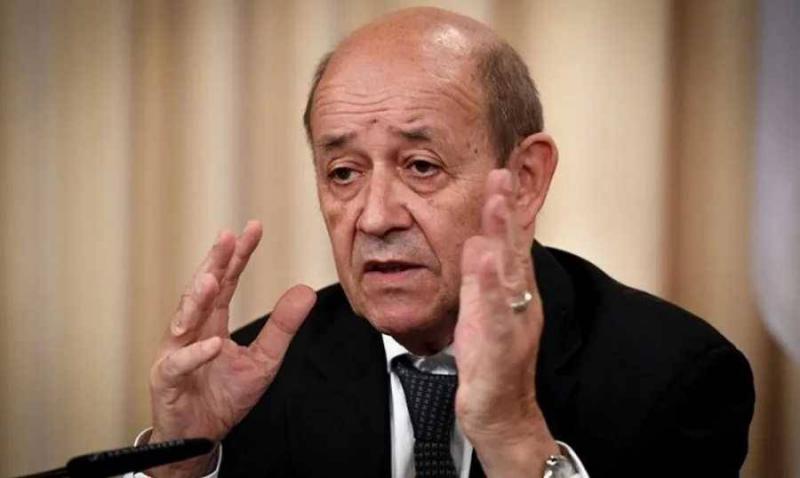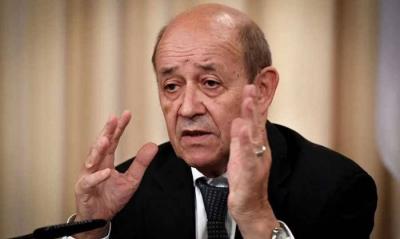The Lebanese are awaiting a more decisive role from the Quintet group to exert pressure on parties to fill the presidential vacuum that has persisted for a year and a half without the Parliament electing a president. However, it appears that the sponsoring countries are not in a hurry for elections until it becomes clear what the "next day" will look like in Gaza, according to "An-Nahar." To fill this lost time, the Quintet will resume its meetings and consultations to bridge the views between the parties in the Lebanese arena to secure the election of a president. American envoy Amos Hochstein wants to take control of the Lebanese file from all its military, political, and diplomatic aspects without contestation. French presidential envoy Jean-Yves Le Drian continues his mission and is making the necessary contacts with the Quintet members and allies to address the presidential vacuum.
Diplomatic sources indicate that Paris expresses deep concern and fears of military escalation in Lebanon, considering that no one can predict the steps that Israeli Prime Minister Benjamin Netanyahu might take, as he holds the decision to escalate and expand the war in southern Lebanon if a diplomatic agreement is not reached. Meetings are being held in France between U.S. Secretary of State Antony Blinken and French authorities to discuss shared interests and resolve obstacles and differences between the two countries, and soon there will be a meeting between a French delegation visiting the United States and the U.S. administration to continue these discussions, as France believes that there is no solution without a Franco-American agreement on its format.
According to diplomatic sources, the presidential envoy, who has visited Lebanon four times as part of his mission and met with various local political players to gather their views on filling the presidential vacuum, will not make a fifth visit to Lebanon before positive indicators emerge that could outline a solution leading to the election of a president within a comprehensive framework that restores the state's role. Paris, through Le Drian, announces its concern regarding the current situation and criticizes Lebanese politicians for not appreciating the gravity of the situation, a stance he has held since he was France's foreign minister.
The envoy of French President Emmanuel Macron continues to play a facilitative role in an attempt to extract an exit or solution to the political deadlock that Lebanon has faced for years. He urges Lebanese officials to act responsibly and consider the current phase to do what is necessary and set the country on the right path. He is closely monitoring the political developments occurring in Lebanon and the region, continuing consultations with parties, assessing new developments in the Lebanese arena, and communicating with members of the Quintet, while being aware of the movement of Quintet ambassadors in Lebanon and still counting on a breakthrough in the presidential file, as he considers that the country is in a tragic situation that requires sincere intentions from political players to fill the presidential vacuum and prevent political stalemate, according to "An-Nahar."
He emphasizes the unity of the Quintet members' stance and their cooperation, denying any disagreement among them since their role is to assist the parties in electing a president. This denies any contradiction among members, and he expresses his satisfaction with the involvement of the countries in the work of this committee. These sources state that Le Drian confirms that France has no candidate for the presidency and that Paris, like the other Quintet members (the United States, France, Egypt, Saudi Arabia, and Qatar), urges local players to reach a consensus on a third candidate given the vertical deadlock the country has experienced for more than a year and a half.
Le Drian commends the initiative taken by the National Moderation Bloc, indicating that several political leaders are beginning to feel a sense of responsibility and are attempting through their movement to reach the best formula through dialogue among the blocs. The existing deadlock, obstruction, and presidential vacuum are leading to further crises and burdens on the country, the state, and institutions, posing a threat to the "continuity of the state" if the situation continues as it is now since the country has lost all state criteria.
Le Drian sees that the absence of a president has diminished Lebanon's presence in negotiations and discussions taking place in the Middle East, warning of political stalemate and calling for the election of a president as soon as possible to ensure the continuity of the dysfunctional state and constitutional institutions. The launching of the anticipated reforms requires the presence of a president and functional institutions, and this internal rift will adversely affect Lebanon's official position during the upcoming negotiations concerning UN Resolution 1701 and the extension of the international forces' mandate next August.
He hopes to revive the call for a conference to support the Lebanese army that Paris had summoned in February, indicating that many essential topics will be on the discussion table after the end of Ramadan. However, he is certain that the solution waits for a ceasefire despite all attempts to separate the issues of the south and Gaza.




